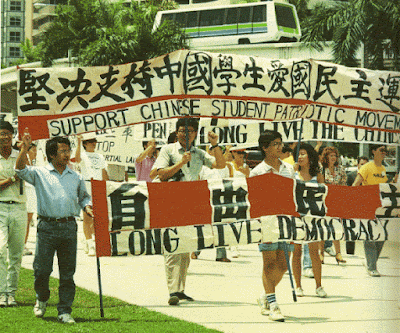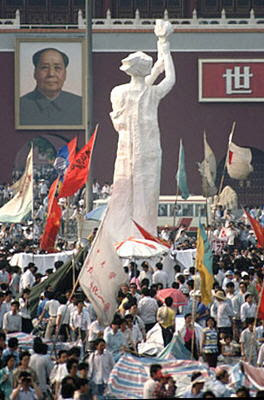“This is for the lost souls of June 4th.” - Liu Xiaobo, Nobel Peace Prize Lecture, 2010
 |
| Vigil for martyrs of the Tiananmen Square massacre in defiance of government ban. |
Despite the orders from the authorities that Hong Kongers
were forbidden from holding an act of remembrance for the martyrs of the Tiananmen Square massacre thousands took to the streets and held their vigil of remembrance.
A time to remember the
thousands of students and workers murdered by the People's Liberation
Army and the more than 800 imprisoned of which at least seven spent over two decades behind bars. There names are Zhu Gengsheng, Li Yujun, Jiang
Yaqun, Chang Jinqiang, Miao Deshun, Shi Xuezhi, and Yang Pu. They were living ghosts. The last to be freed, that we know about, Miao Deshun, was freed on October 15, 2016. He was jailed for 27 years.
Candlelight vigils were held across Hong Kong, and across the world in remembrance of those massacred on June 3-4, 1989 standing up for truth, freedom and life in China.
It
also continues to be the time to demand justice for the dead and to demonstrate our solidarity with brave citizens of Hong Kong and Taiwan who continue to live in freedom despite the threats from Beijing. Below is the statement of the Tiananmen Mothers in 2020 calling for the truth to be told.
 |
Tiananmen mothers hold up photos of their loved ones.
|
Tell the Truth, Refuse to Forget, Lies Written in Ink Cannot Conceal
the Facts Written in Blood On the 31st Anniversary of the June Fourth
Massacre:
by the Tiananmen Mothers
[English translation by Human Rights in China]
This year, 2020, is the 31st anniversary of the June Fourth massacre
that took place in Beijing, China, in 1989. We will not forget the
tragedy. That year, in peacetime, the Chinese government mobilized our
nation’s military force—a force flaunted as "people's soldiers"—and
deployed tanks and armored vehicles on Chang'an Avenue. On their way to
Tiananmen Square, the troops opened fire randomly, ignoring crowds that
lined the streets. They fired even at the students at Liubukou in Xidan
who had retreated from Tiananmen Square. The troops first sprayed
poisonous gas containing nerve-numbing agents to render people
unconscious and then moved the tanks to crush the crowds, in bloody
scenes of unparalleled brutality and inhumanity.
In a movement that had begun in April, around the time of the death
of Hu Yaobang, the former General Secretary of the Communist Party of
China, to the bloody crackdown on June 4, the students were always
peaceful and rational in their petition for dialogue with the
government. Outside the capital, students in many provinces and cities
across the country also came forward to express their solidarity with
the students in Beijing. This was the most magnificent and unprecedented
student movement in modern Chinese history.
The students raised these demands: End to corruption and bureaucratic
turpitude, democracy and freedom, official asset transparency, the
right to speak freely, and a fair and equitable dialogue between the
people and the government. The demands found great resonance throughout
the society. Looking back, from 1979 to 1989, in the ten years of Reform
and Opening-up policies that transformed the national economy from a
planned economy to a market economy, the real beneficiaries of the
reform were the extreme few who held power in their hands. This social
injustice had caused dissatisfaction among the people. As a result,
citizens from all walks of life participated in the marches, raised
questions about people's livelihood, demanded citizens’ right to know,
and made suggestions about people's livelihood. They proposed speeding
up political reform, allowing freedom of the press and, grasping the
true meaning of government, returning governance to the people. This was
a moment of great awakening that brought forth questions and thoughts
among the people about the social problems that had accumulated in the
ten-year ravage of the Cultural Revolution.
It was unbelievable that the government completely ignored the voices
and opinions of the people: it avoided the core substance and dwelled
only on the trivial by only addressing the governance issue. It demanded
the students withdraw from Tiananmen Square unconditionally. The
government's demand was rejected by the students because they worried
that, following their unconditional withdrawal, the government would
come after them to settle scores. And the citizens of Beijing bore
witness to the entire course of the 1989 student movement and the June
Fourth massacre.
Our children and loved ones were killed in the June Fourth massacre.
For 31 years, every family of the victims has lived in the mid of this
suffering and life’s arduousness. We, as citizens of this country and
relatives of the victims, have every reason to question the Chinese
ruling party and the Chinese government. The government bears
unavoidable responsibility for the harm done to all the citizens through
the bloody tragedy that year. Legally, you owe the people
accountability, and morally, you owe the people an apology. The specific
reasons are as follows:
Reason One. The Communist Party of China established a new China in
1949, overthrowing the old system and establishing a new system. Article
5 of the Founding Program (the
Common Program of the Chinese People ’s Political Consultative Conference)
stipulates that the people of the People ’s Republic of China have the
rights to freedom of thought, speech, publication, assembly,
association, communication, person, residence, migration, religious
belief, and demonstrations. Article 35 of the
Constitution of the People ’s Republic of China
also clearly provides the same: Citizens of the People's Republic of
China enjoy freedom of speech, publication, assembly, association,
procession, and demonstration. If the Chinese ruling Party and the
Chinese government have not forgotten their original aspiration, they
should abide by and implement the Founding Program and Constitution
established in the early days of the founding of the country. However,
in its highly centralized rule, the CPC has long forgotten the sacred
rights conferred to citizens by the Constitution. We believe that the
student movement of that year did not exceed the scope permitted by the
law. If the government had conscientiously listened to the opinions of
the people, instead of ending the student movement in such a cruel and
barbaric manner, the process of civilizing the Chinese society would
have accelerated its pace to integrate with the civilized society of the
world, and the corruption in Chinese officialdom would not have been so
rampant.
Reason Two. The politics of "the Elders" was most vividly manifested
in their decision on the June Fourth tragedy. The government's
functional departments were in chaos. The government of a civilized
society resolves social contradictions in accordance with the law, and
resolving social contradictions is the daily responsibility of a
government. However, what we saw was the total disregard of the law by
those who were enthroned as the older generation of proletariat
revolutionaries, who ignored the lives of the people and the existence
of government functions. Even though those old revolutionaries had
already stepped down and yielded their power, they were allowed to wield
the power of life and death of the people at will, and brand citizens
as "counter-revolutionary rioters" and elements "endangering state
power" at will, according to the needs of the ruling class.
Reason Three. We have to ask the Chinese ruling party and the Chinese
government: Which civilized Chinese law expressly confers the
government the right to use state military force to kill, at will,
students and civilians in peaceful demonstrations? The Constitution
provides that state military power is exercised by authorization by the
National People’s Congress. At that time, the students repeatedly called
for a special meeting of the Standing Committee of the People’s
Congress to vote on the use of the army to carry out the crackdown. The
government ignored the students’ appeals. We want to know exactly where
and when the counterrevolutionary riots occurred? Where is the evidence?
Who commanded the riots? What is the truth?
Reason Four. To measure the robustness of a civil society, the level
of people’s happiness index, the level of civilization, and the freedom
of speech are among the most important and necessary conditions. A large
nation that allows only one voice from the authorities and not the
diverse voices of the people, and that is blind to the people's
well-intentioned criticism and supervision of the government's
inadequacies will only produce this result: the unlimited expansion of
the authority of those wielding hefty power, who lord over the people
from the top and unchecked by the law, with the so-called equality
before the law serving as decoration for them.
Over the past 31 years, we have repeatedly called for a legal
resolution to a political problem, through fair and equitable dialogues
with the government in accordance with the law. The government has
remained silent on the June Fourth massacre, without demonstrating the
slightest trace of remorse. With the passage of time, 60 people among
our group of victims’ families have passed away. Time can erase our
lives, but our group ’s resolve in the pursuit of fairness and justice
will not alter. We continue to adhere to our three demands: truth,
compensation, and accountability—in order to obtain justice from the
government for all the victims of the June Fourth tragedy. The dignity
of every single life may not be stripped away and trampled on
arbitrarily by power. They are our loved ones and your compatriots.
124 living signatories, and an additional 60 who have passed away but requested to have their names on letter.
For more information visit:
Standoff At Tiananmen
How
Chinese Students Shocked the World with a Magnificent Movement for
Democracy and Liberty that Ended in the Tragic Tiananmen Massacre in
1989
http://www.standoffattiananmen.com/
Virtual Museum of China '89
http://museums.cnd.org/China89/
http://www.cnd.org/June4th/
Screams for help at China's secret 'black jails' - 27 Apr 09 AlJazeera
https://youtu.be/NsN4-A1G5zc
Seeking Justice, Chinese Land in Secret Jails / NY Times
https://www.nytimes.com/2009/03/09/world/asia/09jails.html
A piece of red cloth by Cui Jian (music video - song sang by him in the Square)
https://youtu.be/l8UPST1ZKSw

































